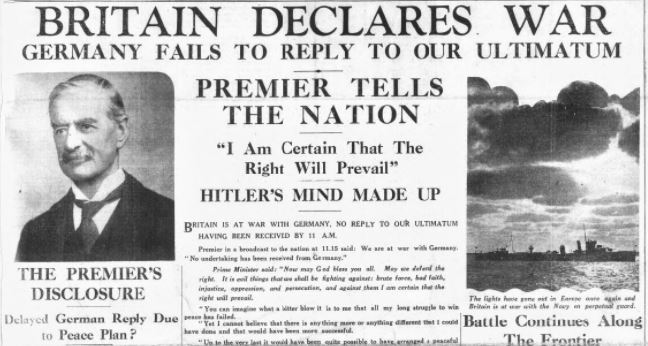In the first of a new occasional series we’re talking to author Richard Tomlinson, whose latest book Amazing Grace: The Man who was W.G, was partly researched using the Archive. We talked about his research techniques and how digital searches can uncover extraordinary detail about famous lives. In Amazing Grace, Tomlinson has painted a picture of a sporting celebrity and a complex man with fresh insights into some of the contradictions that made up the cricketing hero. He told us …
Headlines from History
This Sunday is known in some parts of England as Stir-up Sunday. It’s an old Anglican nickname for the last Sunday before Advent and it’s not actually about baking, or cooking of any kind. The day has been known that way at least since the 19th century although probably a lot longer as the name comes from a reading, or Collect, found in The Book of Common Prayer first published in 1549. The designated text for that particular Sunday, “Stir up, …
Tags
This week we’ve added two campaigning publications to the collection – the Anti Slavery Advocate and the Nation. The former was concerned with sharing the arguments of the American abolitionist movement while the later fought for Irish independence. From a modern viewpoint it is easy to assume that both papers were niche publications, aimed at a very narrow market and not commercially viable – historic oddities in other words. While this may be somewhat true of the Anti-Slavery Advocate started, …
Tags
In the days leading up to the Armistice the sense of expectation in the British press built to a fever pitch. They had of course been following each twist and turn of the political negotiations but as an end to the war became a certainty the excitement built. Suddenly there were practical arrangements to be made, questions to be answered. Local papers sought to find a balance between the momentous historical events that were unfolding and the concerns of a …
Tags
At this time of year you naturally start thinking about all things spooky and here at the British Newspaper Archive we’re no different. We’ve been combing the newspapers in our collection for stories that will send a shiver down your spine and we think we’ve found three great ones. The first takes us right back to 1723 where the Newcastle Courant was all a whisper about some strange sightings. From their somewhat tongue in cheek tone the Courant don’t seem …
Tags
Michelle Higgs is a freelance feature writer, copywriter and author who has written a number of books on social history, particularly around the Victorian era. In late September, Michelle’s latest book Servants’ Stories: Life Below Stairs in Their Own Words will be released. It’s a collection of oral histories, memoirs and biographies from servants covering the period 1800 to 1950, and it includes some great articles found in the British Newspaper Archive. Michelle has kindly contributed this guest blog to …
Tags
Wednesday, September 9th 2015 marks a significant milestone for Britain’s monarchy. It’s the day that Queen Elizabeth II become the longest ruling British monarch in history, breaking the record of her great grandmother Victoria. To commemorate this occasion, we’ve taken a look back on contemporary newspaper reactions to Victoria breaking the same record in 1897. A diamond jubilee was a brand new concept for the Victorian British, as no monarch had yet ruled for longer than 60 years, the closest …
Tags
Newspapers are valuable sources for researching historical events, most especially those of such national importance as a declaration of war. Register now and view 3 pages for FREE In August of 1939, Britain and Poland signed an agreement of mutual assistance. This mean that were any foreign power to interfere with either country militarily, the other would rush to their aid. Days later, on September 1st, Germany crossed the Polish border under a flag of nationalism, on an invented crusade …
Tags
The Anglo-Zanzibar War was a colonial conflict fought by the British during the late 19th century as part of the Scramble for Africa, the divvying-up of the continent carried out by European powers in the 19th and early 20th centuries. While countless wars were fought in the name of imperialism, the Anglo-Zanzibar War stands out thanks to one detail: it is the shortest war in recorded history. Estimates vary as to its actual length, but what is clear is that …
Tags
HG Wells’ novel The War of the Worlds, the story of a Martian invasion of Earth, has had many adaptations since being published in 1898. It’s unlikely that any of these adaptations has developed such an aura of myth and infamy as the Orson Welles radio adaptation of 1938, which was alleged to have caused mass panic across the United States. Conducted as a drama broadcast via wireless, the program went out uninterrupted for more than an hour and portrayed the …


